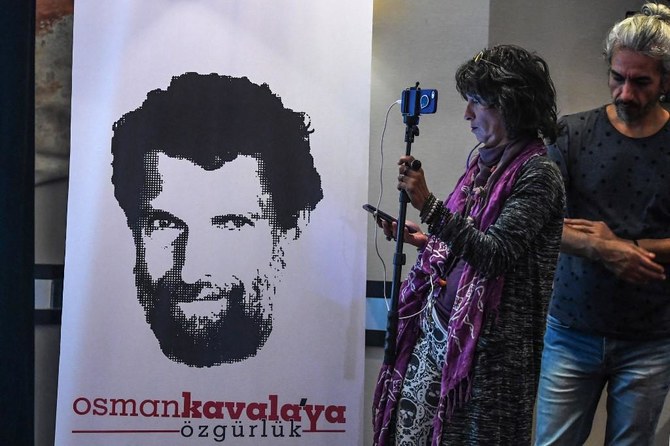ANKARA: Turkey has hit back at US demands to release jailed activist and philanthropist Osman Kavala, who has been behind bars for more than three years without being convicted.
He was found innocent on charges related to 2013 anti-government protests and released, but was rearrested on espionage charges related to the 2016 failed coup attempt. An appeals court subsequently overturned his acquittal on the protest charges.
The US State Department said on Wednesday: “The specious charges against Kavala, his ongoing detention, and the continuing delays in the conclusion of his trial, including through the merger of cases against him, undermine respect for the rule of law and democracy.”
Turkey hit back at “foreign meddling” in domestic affairs, with Foreign Ministry spokesperson, Hami Aksoy, on Thursday calling the State Department’s comments “unprincipled and inconsistent.”
He said no state could dictate judicial processes that were being conducted “independently” by Turkish courts.
There have not yet been any phone calls between President Joe Biden and President Recep Tayyip Erdogan, or between US State Secretary Antony Blinken and his Turkish counterpart Mevlut Cavusoglu.
The State Department’s remarks followed a letter from 50 senators to Biden demanding more focus on human rights issues in Turkey, hinting at a wider problem looming on the horizon between the two countries under the new US administration.
On the 1000th day of his imprisonment, July 27, the US “called upon Turkey to comply with its own commitment to justice and rule of law and release Osman Kavala from detention.”
Kavala is also accused of cooperating with Henri Barkey, a US national and academic, to overthrow the constitutional order in Turkey. Both men deny the charges.
“We also note with concern US citizen Dr. Henri Barkey’s inclusion in these unwarranted court proceedings,” the State Department said. “We believe the charges against Dr. Barkey to be baseless.”
Kavala’s request to be released was rejected last Friday by a Turkish court, a day after Erdogan had blamed the activist’s wife for provoking student protests at a prestigious university in Istanbul.
“The Biden administration is expected to put democracy and human rights at the forefront of its diplomacy, as was demonstrated by the sanctions imposed on Myanmar in response to the recent coup,” Ozgur Unluhisarcikli, Ankara office director of the German Marshall Fund of the United States, told Arab News.
He said it was no surprise, then, that the Biden administration was much more vocal about prolonged court cases in Turkey.
He drew comparisons between the current US administration’s warnings over Kavala’s detention and the handling of Pastor Andrew Brunson's imprisonment while President Donald Trump was in office.
“The Trump administration was very vocal on Pastor Brunson, not because human rights were high on their agenda, but because Brunson’s detention was an issue that agitated the evangelical base of the Republican Party and his release was seen as a success of the Trump administration by the same base.
“As neither Osman Kavala nor Henri Barkey has similar potential in the US, the Trump administration turned a blind eye to those cases. There is now a new administration in Washington which will not ignore such issues.”
Unluhisarcikli said that Turkey’s argument about foreign governments not interfering with its judicial processes would have been more credible if the country’s judiciary had not been politicized and its rule of law had not been badly eroded.
According to the Dimensions of Polarization in Turkey 2020 Survey, 41.5 of Turks said they trusted the country’s judicial system.
“This raises the question why others should trust the judicial system in Turkey if Turks themselves don’t,” added Unluhisarcikli. “While I don’t expect the Biden administration to show a harsh reaction such as Trump did back in 2018, these court cases will remain a thorn in Turkey’s relations with Europe and the US unless resolved very quickly in line with human rights and the rule of law.”
Max Hoffman, a Turkey analyst from the Washington-based Center for American Progress, said the State Department’s comments were another sign that the Biden administration would press issues of democracy and the rule of law in Turkey.
“And it would be an important political signal, were the Turkish government to heed the call, though of course the cases of imprisoned Kurdish politician Selahattin Demirtas and other political prisoners would continue to be an important issue,” Hoffman told Arab News.

























